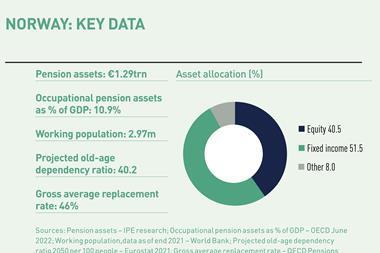Norges Bank Investment Management (NBIM), which runs Norway’s giant sovereign wealth fund, has chipped in to the discussion on Japan’s proposed new guidelines on human rights in companies’ supply chains, saying the draft code could link to international reporting standards.
The manager of the NOK11.9trn (€1.2trn) Government Pension Fund Global also emphasised the need for boards to review company management’s efforts on human rights in supply chains – and for the Japanese government to check up, as time went by, on how the voluntary code was adopted.
In a letter to the Japanese Ministry of Economy, Trade and Industry dated 29 August, NBIM chief governance and compliance officer Carine Smith Ihenacho and Wilhelm Mohn, global head of corporate governance, wrote: “We welcome the introduction of the guidelines with the aim of encouraging companies to respect human rights.”
They said they were “encouraged to see” that the draft code was based on international standards, such as the UN Guiding Principles on Business and Human Rights (UNGP) and the OECD Guidelines for Multinational Enterprises.
In the response to the consultation exercise on Japan’s draft Guidelines on Respect for Human Rights in Responsible Supply Chains, Smith Ihenacho and Mohn said: “We believe that companies should base their sustainability reporting on established international frameworks and standards, and that they should take as a starting point the SASB/ISSB [Sustainability Accounting Standards Board, International Sustainability Standards Board] industry standards and the GRI [Global Reporting Initiative] standards.”
They added: “It could be useful for the guidelines to encourage the use of these standards and to provide guidance on how companies can best report on their human rights efforts, including suggested metrics on which to report.”
NBIM also said it welcomed the recommendations that companies should establish a human rights policy which should obtain management approval.
“In addition to management commitment, we expect boards to effectively review the company management’s efforts,” they added.
“We would therefore encourage the guidelines to also reflect the role of the board in ensuring that a company has a policy to respect human rights and that relevant measures are integrated into corporate strategy, risk management and reporting,” the NBIM pair wrote.
Since the guidelines were voluntary, Smith Ihenacho and Mohn also told the ministry they would encourage monitoring their uptake and implementation over time.
In the draft of the guidelines it put out for consultation this summer, the Japanese ministry said that, in relation to its work to implement the UNGP, the Pacific nation was particularly expected to display its leadership in disseminating and promoting efforts to respect human rights – since it had developed supply chains with Asian countries.
Read the digital edition of IPE’s latest magazine

Topics
- Asia Pacific
- consultation
- Corporate governance
- ESG
- Global Reporting Initiative (GRI)
- Government Pension Fund Global (GPFG)
- human rights
- International Sustainability Standards Board (ISSB)
- Japanese Ministry of Economy, Trade and Industry
- Norges Bank Investment Management (NBIM)
- Norway
- Reform & Regulation
- Sustainability Accounting Standards Board (SASB)
- UN Guiding Principles on Business and Human Rights (UNGP)



















